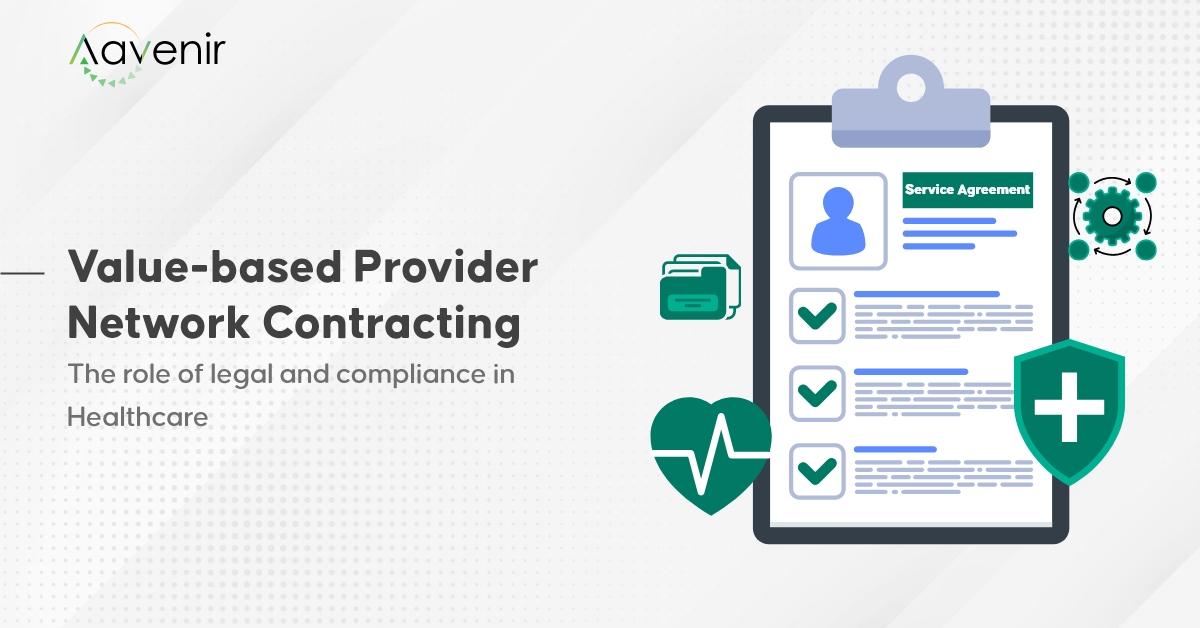When people interact with the healthcare system, it’s typically a connected experience where one interaction leads to another: a doctor’s visit, a trip to the pharmacy, medical equipment, a course of physical therapy, a hospital stay, and so on. The conditions and terms under which healthcare services or products are provided across the healthcare value chain are outlined in a value-based healthcare provider network contracts. These contracts can be between various parties in the healthcare value chain network, such as
- Healthcare providers such as hospitals, integrated deliver networks (IDN’s), clinics, physicians, and practitioners,
- Life Sciences medical device, equipment, and diagnostics manufacturers, pharmaceutical companies, and Contract Research Organizations(CRO’s)),
- Healthcare payers, PBM’s, and pharmacies
- Employers and patients patients
- Government entities
The care-giving landscape is changing rapidly in a post-pandemic world. Many patient journeys now begin online, thanks to the proliferation of digital interaction models. The location of care is shifting from inpatient or hospital settings to outpatient facilities—and, when possible, to the patient's home. These shifts in the delivery of healthcare services and products are resulting in more competitive ecosystems of participants, including hospitals, the public sector, pharma, MedTech, and technology firms – all of whom are getting closer to patients and engaging with providers for research, care-giving, and patient services. To compete in the market and ensure successful healthcare outcomes, all such stakeholders that contract with providers must navigate provider contracting complexities and speed up processes and business operations while managing legal and regulatory compliances.
As per the American Health Lawyers Association, in the US, the average time to signature for healthcare contracts is 30 days. The shortest time to signature is 10 days and the longest time to signature is 90 days.
Complexities and challenges with managing healthcare provider contracts:
- Elongated provider onboarding processes: As a part of the onboarding process, excessive verification and credentialing cycles needs an accurate and complete provider data. Collecting provider information over multiple emails back and forth results in delays and inaccuracy of data.
- Extensive provider verification: While onboarding selection, Healthcare and Life Sciences organizations must verify the provider's credentials, certifications, qualifications, licenses, education, Tax Id, address, training, and work experience. The improper verification processes can lead to fraud, regulatory risk, cost overruns, and most importantly, compromised quality of care.
- Adherence to regulatory standards: Healthcare organizations must comply with a wide range of state and federal regulations. Failure to comply can result in fines and penalties. Contract managers need to ensure that providers have the multiple necessary regulatory standards such as below and more before entering into contracts.
-
- FMV validations
- Exclusion list checks
- ACA
- HIPAA
- Sunshine Act
- Stark Laws
- Anti-corruption and anti-bribery requirements
- Codes of Ethics
- A variety of provider contracts. Not all provider contracts are created equal. The organizations contracting with providers need to adapt processes to a wide variety of contracts such as provider services agreements, clinical research agreements, speaking engagements and so on. These agreements have several commonalties, and at the same time have their own unique terms and conditions, pricing and incentive arrangements, regulatory compliance requirements, and performance requirements.
- Ill-defined contract processes. Inefficient and inconsistent contracting process lead to delays in contract execution, missed deadlines, and errors in contract administration. For example: Negotiating in-network and out-of-network provider fee schedules and payments, validating the same against FMV benchmark databases, and obtaining approvals for exceptions can be a lengthy process.
- Multiple stakeholder collaboration: Healthcare provider engagement decisions often involve multiple stakeholders, such as provider onboarding, contract administration, patient services, legal and compliance, and finance teams. Effective contract management requires clear and open communication between all parties involved in the contract. Aligning the interests and priorities of these stakeholders can lead to delays in decision-making.
- Changing market and regulatory compliances: The healthcare industry is constantly changing with new regulations and compliances, and this can necessitate the renegotiation or re-compliances of existing contracts. It can be a time-consuming and expensive process. For example: covid outbreak or any other pandemic requires rapid amendments and changes to existing contracts by either updating existing clauses or regulatory requirements or by adding new provisions to existing contracts in bulk, etc.
- Provider performance monitoring and evaluation: After the contract is signed, healthcare organizations often continue to monitor and evaluate the performance of providers to ensure quality of service, maintenance of credentials, training and certification requirements, and adherence to organizational quality and reporting standards. Inability to manage and track provider performance resulting in regulatory noncompliance and lower patient satisfaction. Healthcare contracts can also lead to misunderstandings between the parties, and to disputes over the interpretation of the contract terms. Inability to manage and track provider obligations can result in regulatory noncompliance and lower patient satisfaction.
To address these challenges and risks in healthcare contracts, organizations, it is essential for organization to have purpose built and pre-configured provider contracting solution which handle such complexities. Aavenir Providerflow, an AI-powered healthcare provider contract lifecycle management solution built on ServiceNow enables provider onboarding, contract management & performance management.
How Aavenir Providerflow can help manage healthcare provider network contracts?
1. Provider onboarding
Aavenir Providerflow provides faster, accurate and complete provider onboarding using configurable pre-qualification, verification, and approval workflows. Organizations can easily setup onboarding requirement checklists, qualification requirements and pre-qualification questionnaire templates. Organizations can collect all the important provider information, credentials, certifications, qualifications, licenses, education, Tax Id, address, training, work experience and store in a centralized repository.
2. Self-service provider registration
It enables providers to complete onboarding tasks, get their questioned answered, and fulfill requests for additional information, certifications, contracts, and more. The solution provides flexibility to providers for submitting, managing and updating their own data via intuitive guided Providerflow portals. This ensures that the provider data is always current and up to date.
3. Automated provider info verification
The solution verifies NPI IDs, addresses, and CAQH credentials. receive real-time alerts for non-compliance against HHS-OIG, FDA, State Medicaid and federal and state exclusion list.
4. Centralized healthcare contract repository
Aavenir Providerflow can store all contracts in a centralized repository and allows you to search contracts by type (e.g. physician agreements, supplier contracts, payer contracts). All contracts are stored in a HIPAA-compliant secure repository with role-based access control on ServiceNow Platform. Contract record also has an ability to attach relevant documents (e.g. credentialing documents for physicians). NLP enabled full-text search ensures that contracts are easily accessible when needed.
5. Automated alerts and notifications
There are often strict deadlines that must be met for various regulatory requirements in the healthcare industry. For example, contracts with payers may need to be renewed on an annual basis, and failure to meet this deadline could result in the organization losing its ability to bill for services. Aavenir Providerflow solution sends automated email alerts and notifications that remind the organization for upcoming deadlines, helping to ensure that all deadlines are met.
6. Contract version control:
In the healthcare industry, contracts may be revised frequently due to changes in regulations or changes in the organization's relationships with healthcare providers. Aavenir Providerflow as a healthcare contract management solution provides version control features that allow the organization to track changes made to contracts over time and ensures that they are always working with the most up-to-date version.
7. Customizable contract lifecycle workflows:
There are often complex approval processes that must be followed in order to execute a contract in healthcare industry. For example, a physician agreement may need to be approved by the medical staff committee, the board of directors, and the legal department before it can be executed. Aavenir built on ServiceNow platform offers full-flexible workflow configuration feature that can be customized as per organization’s approval processes, helping to ensure that everyone is involved at right time and contracts are executed in a timely and efficient manner.
8. Reporting and analytics:
Aavenir Providerflow offers detailed reporting and analytics features that allow the organization to track key metrics such as payer mix, Fair Market Value Benchmarks and exceptions, reimbursement rates, and denials, helping to identify areas of opportunity and improvement. Provider information dashboards helps you measure contract performance and generates reports for FMV compliance, Sunshine Act compliance, sanctions and exclusions.
9. Provider performance tracking
Aavenir Providerflow helps you evaluate healthcare providers' performance (contract KPIs) in accordance to contract terms and obligations mentioned in contract. Data collected through performance tracking enables evidence-based decision-making in healthcare contract management and optimum resource allocation. By tracking performance metrics, healthcare organizations can identify potential risks, key areas for improvement and implement strategies to enhance the quality and safety of patient care.
10. Compliance management:
There are numerous regulatory requirements that must be followed in order to avoid fines and penalties. For example, contracts should ensure FMV compliance in which businesses and individuals must use reliable and objective methods to determine the fair market value of the relevant assets or transactions. Aavenir providerflow offers compliance management features that ensures that contracts are executed in accordance with regulatory requirements and ethical standards. The solution can also automatically flag contracts that do not comply with FMV, HIPAA, Stark Law, or any other regulations, helping to ensure that the organization stays in compliance.
11. Mass/Bulk contracting
Aavenir Providerflow can process mass contracts to streamline compliance efforts, save time, and maintain standardized documentation for all business associate relationships. It ensures that all contracts are compliant to all latest laws and regulations. For example, Bulk Business Associate Agreement (BAA) contracts refer to a practice where multiple Business Associate Agreements are executed in large quantities, often simultaneously or in a single batch. Mass BAA contract processing allows covered entities to efficiently manage their relationships with various business associates, such as electronic health record (EHR) vendors, cloud storage providers, billing services, and other entities handling protected health information (PHI). CLM solution makes BBA contract processing so quick and easy ensuring compliance and standardization for all business associate relationships.
Closing Thoughts
In conclusion, managing healthcare provider contracts is a complex and critical task that requires close attention to detail and a comprehensive understanding of the terms and conditions outlined in the contract. By using provider contract management solution such as Aavenir Providerflow, healthcare organizations can ensure maximum value is derived from their contracts, maintain regulatory compliance and combat potential breaches of contract and frauds.
Want to find out how Aavenir Providerflow can optimize your healthcare provider contracts management processes,


